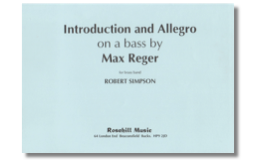Results
-
Trumpet Tune and Air - Clarke, Purcell - Len Jenkins
Wobbleco Music is pleased to offer a new arrangement of the famous 'Trumpet Tune in D' for full brass band featuring a soprano cornet solo. The tune is often attributed to Henry Purcell, but in fact was the result of a joint musical production by Jeremiah Clarke and Daniel Purcell (Henry Purcell's younger brother), hence the confusion. For bands that do not have a soprano cornet player, we also include an alternative solo part written for Bb cornet. To complement this, we also include a soprano cornet part in Eb, for use when the band has a soprano player but who is not the featured soloist. Recognising its popularity for weddings and special occasions, where a full band may be impractical for space or availability reasons, we have also produced a quintet edition, which is available as a separate publication from Wobbleco Music.
-
 £52.00
£52.00Introduction and Allegro on a bass by Max Reger (Score only) - Robert Simpson
The fourth work for brass band to come from Robert Simpson's pen has enriched the repertory still further. Introduction and Allegro on a Bass by Max Reger was composed between the end of June and the beginning of November 1986 at the request of Howard Snell and was commissioned by the Desford Colliery Dowty band. The Introduction is mainly mysterious and deliberate while the Allegro is full of energy. The Bass is question is taken from Reger's Fantasia and Fugue in D Minor, opus 135b, and at one point, near the end of the work, Reger's own treatment of the bass is used. The rest is pure Simpson. Duration: 16:00
Estimated dispatch 7-9 working days
-
 £62.00
£62.00Introduction and Allegro on a bass by Max Reger (Parts only) - Robert SImpson
The fourth work for brass band to come from Robert Simpson's pen has enriched the repertory still further. Introduction and Allegro on a Bass by Max Reger was composed between the end of June and the beginning of November 1986 at the request of Howard Snell and was commissioned by the Desford Colliery Dowty band. The Introduction is mainly mysterious and deliberate while the Allegro is full of energy. The Bass is question is taken from Reger's Fantasia and Fugue in D Minor, opus 135b, and at one point, near the end of the work, Reger's own treatment of the bass is used. The rest is pure Simpson. Duration: 16:00
Estimated dispatch 7-9 working days
-
£50.00
A Cotswold Suite - Stephens, D
I. March: 'Venice of the Cotswolds'II. 'Afternoon by the Windrush'III. Scherzo: 'Ducks and Drakes'
In Stock: Estimated dispatch 1-3 working days
-
£50.00
-
£50.00
A Wessex Suite - Broadbent, D
March: Sturminster HighSerenade: Child OkefordScherzo: Saxon InnDedicated to John and Margaret Grinnell for their work with the Wessex Youth Course
In Stock: Estimated dispatch 1-3 working days
-
£33.00
Backdraft - Zimmer, H - Stowell, D
This arrangement of the exciting title track to the film "Backdraft" will suit all levels of bands. A brilliant finisher to a programme, lots of loud passages (will definitely set the audience alight!!)4th section +
In Stock: Estimated dispatch 1-3 working days
-
£33.00
Batman The Movie (Theme) - Elfman, D - Catherall, A
From the 1989 Batman movie this piece by Danny Elfman has gone on to become iconic.Courtesy of World of Brass
In Stock: Estimated dispatch 1-3 working days
-
£33.00
Battle of Britain - Goodwin, R - Barry, D
From the famous 1969 film staring Laurence Olivier, this music, written by Ron Goodwin, is instantly recognisable and a great crowd pleaser.
In Stock: Estimated dispatch 1-3 working days
-
£33.00
